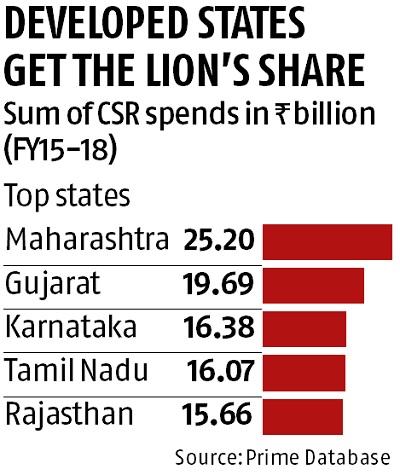Why in news?
According to official estimates bulk of CSR is being spent on developed states like Maharashtra, Gujarat and Karnataka.
What is the CSR process in India?
- Corporate Social Responsibility ( (CSR) is the procedure of assessing an organization’s impact on society and evaluating their responsibilities.
- It begins with an assessment of the following aspects of each business:
- Customers.
- Suppliers.
- Environment.
- Communities.
- Employees.
- India is the first country in the world to make CSR mandatory.
- An amendment was made to the Company Act, 2013, by which Businesses can invest their profits in areas such as education, poverty, gender equality, and hunger.
- The amendment to the Companies Act advocates that those companies of a certain size are required to mandatorily spend 2 per cent of their average three-year profits on CSR.
- The primary reason that mandatory CSR has come into being is in order to increase engagement with the local community it operates in.
- This is also seen in the CSR regulations which require giving preference to the local area of operation.
What are recent findings on CSR in India?
- According to official reports a fifth of CSR spends between 2014-15 and 2017-18 was spent in Maharashtra, Gujarat, and Karnataka.
- An analysis looked at the sum of CSR spends since 2014-15 from corporate tracker, PRIME Database.
- This was compared to government figures on gross state domestic product at factor cost (current prices) for the 32 states and Union Territories for which the CSR data is available.
- The correlation between the state’s economic output and the amount of CSR spends is 0.93. Zero indicates no correlation; 1 indicates perfect correlation.
- By this it has been spotlighted that Companies spend most of their corporate social responsibility (CSR) budgets in states which are well-developed.

What are the concerns highlighted by the report findings?
- Six Indian states which house almost 60 per cent backward districts have received only 15 per cent CSR fund.
- Whereas five states, with about 15 per cent concentration of backward districts, have received more than 70 per cent CSR funds.
- Such concentration is in contrast to government allocation of resources, which seems to reallocate capital to poorer regions.
- Uttar Pradesh (UP), Bihar, and Madhya Pradesh (MP) get the maximum share of central resources, shows the data on the devolution and transfer of resources from the Centre.
- Poorer and undeveloped states such as Bihar, UP, and MP have few manufacturing units but are now top markets for many companies in industries such as two-wheelers, tractors, and other consumer goods.
- But these states get a minuscule share of CSR budget from top companies in these industries.
- The current CSR guidelines don’t cover the companies’ supply-chain such as vendors, distributors, and retailers.
- The biggest impact companies can make is to improve the lives of people who are part of their supply chain, but most companies ignore this due to a lack of mandate.
What measures needs to be considered?
- Company’s CSR can only be seen as a supplement to government spending in places where these firms are present.
- Corporate spending in such developed states can help free up resources for backward regions.
- But companies should also consider key markets when they look at areas for doing CSR.
- There is a need for steps, including working with NGOs, to help scale up operations in backward regions.
- It is critical to work and strengthen the capacities of not-for-profits with a footprint in these geographies, allowing pilot initiatives to scale and enhance their abilities to absorb more funding.
- Higher level of collaboration between the government, industry and NGOs through a special purpose vehicle/platform can also be considered.
Source: Business Standard
